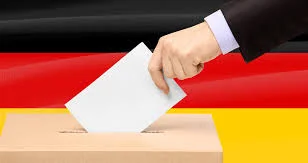Libertarians Attempt To Again Take Germany by Surprise By Richard R. Moeller
Before the German Federal election of 2013, the Free Democratic Party “The Liberals” (or more precisely Libertarians) frequently molded the formation of the national government after the votes were counted. They ‘made’ German governments complete by using their small allotment of support to establish a consensus required by the German Basic Law or constitution to construct a coalition. Often, the party with the plurality would court the Free Democrats (FDP) to complete the majority of seats in the federal lower chamber – the chamber that legitimately matters.
The last time the FDP used this arrangement to become part of the national ruling coalition was in 2009. In fact, the FDP was able in this election (with 14.6 percent) to form with the Christian Democrats (CDU/Merkel). However, the FDP, if they had not disagreed with the Social Democrats (SPD) quite so much, could have even joined with them along with the Greens to form government.
Indeed, before and after the reunification of Germany, the FDP were repeatedly seen as “power brokers.” This power came in many forms. The most obvious way was the typical negotiations of the FDP to have one of their own as German Foreign Minister, Vice Chancellor, or both.
That’s real power from a party that was unable to beat the CDU or SPD in any of the head to head elections in 2009. The SPD and Greens courted the FDP in 2009 to create a “traffic light” coalition with them: red (SPD), yellow (FDP), and the Green (GRÜNE). The FDP said then, “a coalition with the SPD and Greens [was] out of the question.”
The FDP was crushed in the last federal election (2013) only receiving 4.8 percent of the national vote. Under German law, a political party with less than 5 percent of the vote may not sit in the Bundestag – no matter how well a party does in various regions in Federal Republic. The FDP failed in both of these.
They did not show well even in the North/Western part of the country where they have traditional support, plus the required hurdle of gaining at least 5 percent meant that they could not act as a power broker. In fact, the hurdle kept them out of national government completely.
The practical reason for the hurdle is to keep radical parties supported in one part of the country from focusing all its attention to that region. Theoretically, disallowing extreme parties, not represented across the whole of the nation, will also automatically reject parties that have Nazi notions.
No one has seriously insinuated that the FDP might be an extremist party to be kept out of parliament. This German party has been solid since its inception back in 1948. The lack of support in 2013 had to do with its message.
In many ways, the FDP was overshadowed by the CDU on foreign policy and trade as well as being overshadowed by the SPD on civil liberties and minority protection. Today, this is no longer the case. Each major party in Germany now has significant baggage. The far Left and Right in Germany have negligible enthusiasm as September approaches.
For the FDP, 2017 holds great promise. It’s not out of the question that the FDP may act as a power broker again. Additionally, the party’s new leader Christian Lindner is ready to do more. He has been compared to French President and political golden boy Emmanuel Macron.
Lindner is young, but experienced. He sees the (once) overshadowing of the major parties as an asset. Germans are looking for freshness and Merkel is anything but. Moreover, he wants to grab the sovereignty issue from the rightist Alternative for Germany (AfD) and civil liberties from the Left Party. The FDP is in marketing overdrive.
The party known for traditional and practical members is now looking to young, social media types frustrated with the obsessive politicians bent on tearing down other views. Things are looking up now. We’ll see in September.
Richard R. Moeller is an Associate Professor of Political Science at The Metropolitan State University of Denver.





